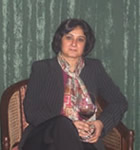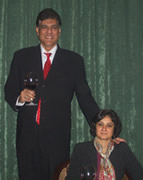Photos By Adil Arora
Delhi based Gupta family which owns Amfora wines may be relatively new in business but the full time occupation of importing and marketing wine in India makes them truly the First Family of Wine in India, writes Subhash Arora who chatted with them at length
 Ranjit Gupta founded Amfora Wines in December 2006 but did not start marketing until the beginning of January 2007. He does not come from a family where he was fed milk in Riedel stemware. He was fully occupied in the export of shoes and leather products to Europe until 2006 when he went to Italy thrice with wife Nanda to visit vineyards and taste wines for import, primarily from Veneto, Tuscany and Sicily. Ranjit Gupta founded Amfora Wines in December 2006 but did not start marketing until the beginning of January 2007. He does not come from a family where he was fed milk in Riedel stemware. He was fully occupied in the export of shoes and leather products to Europe until 2006 when he went to Italy thrice with wife Nanda to visit vineyards and taste wines for import, primarily from Veneto, Tuscany and Sicily.
Earlier a chance visit to Vinitaly 2006 organised by the Indian Wine Academy for an EU sponsored programme for importers is what started the wheels rolling in the couple's mind, admits Nanda. 'Ranjit had been extremely busy but we had been vaguely discussing the possibility of starting import of wines since all our family enjoyed drinking wine. We thought it was a great opportunity to taste some fine wines and check out the possibility of imports,' says Nanda enthusiastically.
While they met two producers-Elena Walch and St. Michel Eppan, they did not have time to visit any vineyards after Vinitaly. 'So we went back to Veneto, Alto Adige, Piemonte, and Emilia Romagna where we met several producers and later went to Sicily as well,' says Ranjit who had decided to plunge into wine imports by now, with Nanda promising him assistance in locating vineyards and sourcing wine.
Isheeta, the elder daughter had finished her college in Lady Shriram College with English as the major in her B.A., and after doing an MBA was working with Philip Morris. She jumped at the idea of helping her parents market wine. But their passion for wine ultimately brought the First Family of Wine into existence- with her younger sibling still having a blast at Warwick, London
Italian Specialists
Having spent many years travelling to Italy and perhaps being members of the Delhi Wine club, Italian wines became the first love for the Guptas. It was not that they started drinking wines after joining the club. 'We have always enjoyed an occasional bottle of wine though 15 years ago it had to be Indian wines only as nothing else was available then,' admits Ranjit, adding that on every special occasion a bottle of wine would always be opened in the family who would also cherish a bottle of Aussie wine every time his sister living in Perth would visit them.
 Isheeta says, 'the credit for their joining the club should go to me. While working with Philip Morris I came across the Delhi Wine Club's website while searching for wine sites in India. I knew how much my parents loved wine and told them to check out the website.' She also presented them with a wine guide to help them expand their wine knowledge. Isheeta says, 'the credit for their joining the club should go to me. While working with Philip Morris I came across the Delhi Wine Club's website while searching for wine sites in India. I knew how much my parents loved wine and told them to check out the website.' She also presented them with a wine guide to help them expand their wine knowledge.
They translated their preference for Italian wines into the first container load which was a selection based on their personal tastes.' Our objective was to pick up top 4-6 estates from each region that we focussed on, 'says Nanda. 'This did not mean we were looking for the top brands or top selling wines in terms of volume but the small to medium producers who were known and respected for their quality, even though they were slightly more expensive because of lower levels of production,' she adds. ‘In terms of big brand names, we are representing Santa Margherita from Italy.’
Amfora is known to have a quality portfolio for Italian wines today and is well respected in all the five star hotels including ITC and Taj throughout India, Shangri-la, Imperial, Hyatt, Park, Inter Continental, Radisson and Metropolitan in Delhi and Hyatt, Grand Hyatt, and JW Marriott in Mumbai.
Stand alone premium restaurants like Olive, Ai, Diva, Smoke House Grille and Flavours list their labels as well.
One Does Not Drink Italian Alone
 'We faced a lot of problems initially not only because we were new with no credentials but the hotels would not entertain us because our portfolio consisted of only Italian wines. They in fact, prefer a one stop shop importer who can supply them not only multi-national wines but beer and liquor as well,' says Isheeta. So the family decided to diversify into other countries for sourcing wines. 'We faced a lot of problems initially not only because we were new with no credentials but the hotels would not entertain us because our portfolio consisted of only Italian wines. They in fact, prefer a one stop shop importer who can supply them not only multi-national wines but beer and liquor as well,' says Isheeta. So the family decided to diversify into other countries for sourcing wines.
'The New Zealand selection is entirely mine,' says Nanda who went alone to New Zealand and tied up with Seresin, Staetland and Huia wineries last year.
Today they also have wines from France, Spain, Australia, New Zealand, Chile and Germany in their portfolio although, 'we maintain a majority of 60-odd labels from Italy and 55 from the rest of the countries. We would like to prune the total number of labels down to 90 though,' says Ranjit.
With the portfolio already overflowing, what role would Nanda play in the selection? 'Wine selection is a dynamic process. We have to constantly keep a watch over our portfolio and delete non-selling wines,' says Nanda. 'Besides, we have to travel to wine shows, visit our existing suppliers and taste new vintages etc. as well as keep a tab on the wines of our competitors.'
Genuinely in love with wine, Ranjit and Nanda regularly drink 1-2 glasses of wine (she takes one, he takes two). 'Wine is an adventure for us. We love to try different wines-specially the competitors', says Nanda. They like to visit Shangri-la where they can order and taste a flight of 4 wines at the wine bar.
Isheeta likes to have a glass of wine with her dinner occasionally but is quite selective. 'I drink when I know it is good wine-otherwise I am happy with Weiss beer as well,' she says.
The Guptas are also a family of foodies that loves to eat and cook all kinds of food from Italian to Korean to Mangalorean. Isheeta says that her father ‘makes the best tiramisu you can get in this country. He also makes a mouth watering ham glazed with honey and often the family often wakes up on Sundays to the aroma of freshly baked homemade bread. We all make pasta—my mum makes fabulous fish dishes, prawns, salads and pesto based sauces which are her favourites. Occasionally in the winters we have fondue night with nice wine.’
Marketing Challenges through the eyes of Amfora
'As a relatively newcomer to the industry I can admit that the biggest problem we face are the government regulations like any other importer. Apart from our warehousing costs, the regulations cost us the most,' says Ranjit with a look of disgust in his eyes.
Excise License Cost and TP
 'Take for example the Delhi Excise. We pay an annual license fee of Rs. 5 lakhs ($10,500) whether we import only wine or beer, whisky and other hard liquors as well. Where is the logic of it if we import wine alone? This forces us to think of adding beer and hard liquor to our portfolio which we don't want to, and we find it frustrating,' says Ranjit. 'Take for example the Delhi Excise. We pay an annual license fee of Rs. 5 lakhs ($10,500) whether we import only wine or beer, whisky and other hard liquors as well. Where is the logic of it if we import wine alone? This forces us to think of adding beer and hard liquor to our portfolio which we don't want to, and we find it frustrating,' says Ranjit.
'Why can't the excise department split the license fee into parts- say Rs. 1.5 lakhs for wine, same for beer and the balance Rs. 2.0 lakhs?' he questions.
While on the issue of governance, Ranjit also cannot gulp down the system of officious sounding TP-Transfer Permits. 'Every time we ship even a bottle of wine, we must get a TP made-which might take us 2 days. Why can't the department focus and monitor our records? After all, the pharmaceutical companies have similar stringent laws where the scheduled drugs can be sold only to the designated persons!' he wonders.
High Transaction Costs
'Every import shipment is recorded under a different Bill of Entry. Assume we have to deliver 5 different wine labels for a hotel and they were imported under 4 different shipments. In order to de-bond and get them from Veritas, the public -bonded warehouse we rent for storage, we have to fill out 4 different documents to get the shipment out.' As with most other importers, the Guptas have one full time employee and a part time person to handle the plethora of paperwork for customs and excise documentation.
With computerisation this problem will be alleviated. The Mumbai operations for customs and excise are already computerised. Perhaps Ranjit is unaware that due to some inexplicable reasons, most importers are happier with the manual system. Sources inform us that the computerisation work is going on and within 6 months Ranjit and other importers in Delhi would have at least one less reason to quibble about.
Bank Guarantees for public bonded warehouses
This is another factor that puts a severe financial strain on importers like the Guptas. 'We have to submit guarantees at 25% of the duties applicable on our total stocks. Since the banks require 100% margin money, it implies that we have to deposit 40% of the cost of wines as margin at 160% custom duty.'
'Wait a minute! The duty is 150%. But the 4% SAD (Special Additional Duty) you pay is refundable. Don't you get the refund automatically?'
'Are you kidding? Have you ever tried to get a refund from the government? We don't think it is worth the headache to try to get it back,' he says visibly upset.
This implies the government is getting rich with all that un-refunded money in their coffers. The US and EU have already raised an objection to this additional duty beyond the agreed 150% outside limit agreed with WTO. No one has satisfactorily explained the logic of first collecting the special tax and then refunding it.
 'The frustrating part is that the bank guarantees are applicable to bonds operated by private companies only. The government owned Central Warehousing Corporation is exempt from this financial rigour. But CWC is so bureaucratic, incompetent, inefficient and with no temperature controlled facilities. So a wine importer cannot dream of using their warehouses. Why should a privately owned public bond be discriminated against?,' he wonders. A very pertinent point, as the guarantees are given individually to the customs department, although through the bonder. 'The frustrating part is that the bank guarantees are applicable to bonds operated by private companies only. The government owned Central Warehousing Corporation is exempt from this financial rigour. But CWC is so bureaucratic, incompetent, inefficient and with no temperature controlled facilities. So a wine importer cannot dream of using their warehouses. Why should a privately owned public bond be discriminated against?,' he wonders. A very pertinent point, as the guarantees are given individually to the customs department, although through the bonder.
Interest on delayed de-bonding
Another irritant faced by this First Family is the levy of interest if the wine is not withdrawn from the duty free bond within 90 days. 'The authorities are perhaps not even aware that some wines may need aging before selling. Many wines are slow moving and may not sell at all- this is a part of the business. After all only when we sell can we de-bond and that is the time the government should be entitled to collect the duty. The interest payment is so unjustified,' laments Isheeta.
'But they have similar system of duty- free bonds throughout the world!' I comment. 'I have talked to importers in several countries. They have not heard of this interest factor. They store wine in the bond, and pay the applicable duty as they take out the wine,' says Ranjit.
National Coverage
The Guptas do not claim to be national players in marketing imported wine though 'we are certainly not local or regional players either,' says Ranjit. 'We have deliberately left out the North East as they want very cheap, low end wines. Similarly we have strategically delayed entry into Punjab and Madhya Pradesh.'
Isheeta confirms that they are present in Delhi, Maharashtra, Karnataka, West Bengal (Kolkata), Chennai, Andhra Pradesh (Hyderabad), Haryana, Kerala, Rajasthan, Goa and UP in a limited way.
And what are the difficulties they face from marketing standpoint?
Education
'Lack of education at the F & B level is a big drawback. Many of them are not aware of the diversity and different levels of quality,' says Ranjit. 'Can you imagine that one hotelier we had taste an Italian wine made from indigenous grapes was condescending about another wine and would not buy it; he felt that since it was made from regional and not French grapes, it would be of inferior quality!' says Isheeta narrating an instance.
Italy, Spain and Portugal thrive on the local varietals some of which give excellent wines. 'Many are not even aware that most whites should be of young vintages,' adds Ranjit.
Listing Fees
 A relatively new phenomenon, perhaps encouraged by the older importers with huge portfolios, has many hotels start demanding Listing Fees which might be workable if it related to the sales volumes. ‘But merely listing ten wines and expecting a fee of Rs. two lakhs seems unfair and that is a problem at times,’ says Ranjit. A relatively new phenomenon, perhaps encouraged by the older importers with huge portfolios, has many hotels start demanding Listing Fees which might be workable if it related to the sales volumes. ‘But merely listing ten wines and expecting a fee of Rs. two lakhs seems unfair and that is a problem at times,’ says Ranjit.
Exciting Portfolio
Undoubtedly, the Guptas have brought in a breath of fresh air to the imported wine industry because of their passion. Whether it is the top Chianti Classico from Giuseppe Mazzocolin's Felsina Estate in Berardenga, a wine-on-allocation from New Zealander cinematographer Michael Seresin's Estate in Marlborough, an Amarone from Tommasi of Valpolicella, or a Teroldego Rotaliano Granato from the biodynamically farmed vineyards of the Italian superstar winemaker Elisabetta Foradori, their wines have a lot of character and personality that true wine connoisseurs appreciate throughout the world.
There is a method behind the wine selection by the Guptas. 'Why should we follow the beaten path and go only to the old regions and run after known name brands?' wonders Nanda. 'I found the wines from Alto Adige and Friuli very exciting. Toreldego is a great Italian local grape variety that makes excellent wine. We are trying to cater to a new breed of young, affluent and adventurous wine drinkers in 5-star hotels and get some exciting wines, even though they may cost slightly higher,' she adds.
Ranjit is slightly disappointed by the carbon-copy of the wines in several hotel lists with most not willing to have a change.
Not Boutique wines alone
 Ranjit laughs when he narrates incidents of people incorrectly referring hem as boutique wine importers. 'True, we have interesting and some top quality brands. But the wineries we represent are really medium size estates who can deliver quality as well as quantity,' he says. Ranjit laughs when he narrates incidents of people incorrectly referring hem as boutique wine importers. 'True, we have interesting and some top quality brands. But the wineries we represent are really medium size estates who can deliver quality as well as quantity,' he says.
But over the short period they have been on the wine scene, they have realised the importance of entry level and low-end wines too. Isheeta is quick to roll out the list of wines that are available in retail for as low as Rs. 420 ($8.50) in Gurgaon, where imported wines are cheaper due to no excise duty applicable per bottle. 'Rs. 650-700 for a Barossa Valley Shiraz from Grant Burge is a great buy. We even offer some Italian wines at very good prices-as low as Rs. 750 for a white wine from Santa Margherita, for example,' she adds.
Targets and Future
'We plan to get very aggressive in the NCR region, though Noida is not a part of our plan,' says Isheeta. If you look at the wider canvas, we plan to double our volumes year-on-year,' interjects Ranjit.
Even during this recession, one wonders aloud? 'Surely this has been a setback for everyone. But we are quite dynamic and with the new offerings we are planning, and the new markets we hope to open up, this should be achievable at least for the next 5 years.
Unwilling to part with specific details about their existing sales, Ranjit says ‘you will see our increasing presence over a period of time and then you may make your own judgment.’
Game plan
Is the younger daughter a part of the plan too? Ranjit shrugs off with uncertainty. 'Not in the near future, I am sure.' Isheeta would love to experience a harvest, which she could not so far because of the time constraint. 'I certainly hope to do a few courses in WSET in London soon,' she muses.
 Ranjit does not mind disclosing that the Family has its eyes on wine production in India three years down the line. 'A couple of our collaborators in Italy and France have already expressed a desire to partner us for such a project. 'But we don't want to be a run-of-the mill producer dealing with the existing varieties. We will explore different regions and new varietals like Sangiovese will be on our mind. Ranjit does not mind disclosing that the Family has its eyes on wine production in India three years down the line. 'A couple of our collaborators in Italy and France have already expressed a desire to partner us for such a project. 'But we don't want to be a run-of-the mill producer dealing with the existing varieties. We will explore different regions and new varietals like Sangiovese will be on our mind.
Although Amfora may seem small compared to the multinationals and big, established local players dealing in wines and spirits, one cannot but feel from the enthusiasm of this First Family of Wine that they may create a storm in the Indian wine scene over the next few years.
Subhash Arora
January 13, 2009
|